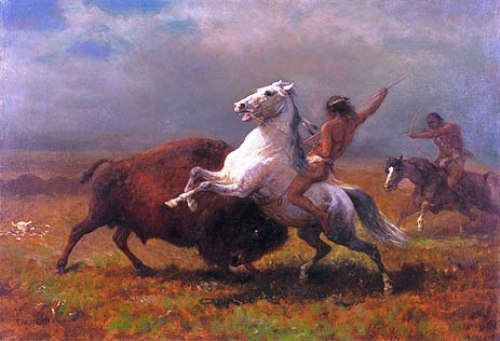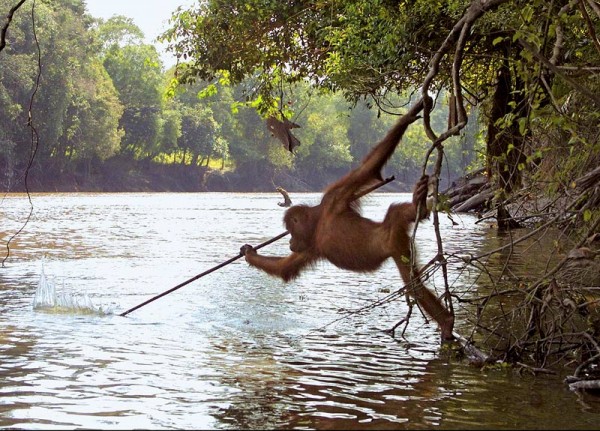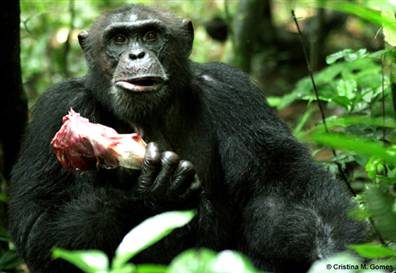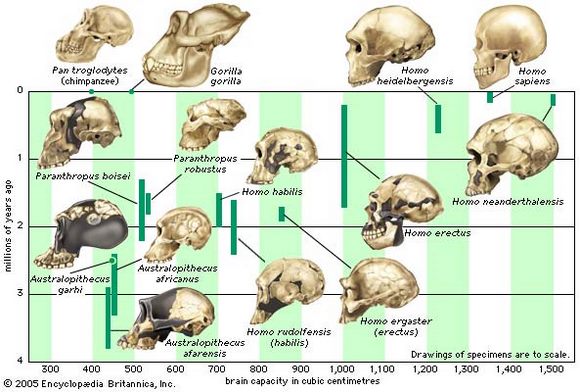We've got a lot going on here in America these days, with towering unemployment, a dying manufacturing industry, huge environmental problems, and the tense fight for all sorts of rights and freedoms, such as GLBT equality and abortion rights. But there are two things that I'd like to remind you of this weekend. First off, not only are there other places far worse off then America, but we really have no idea what's even going on there. As Manu Chao sings below (in Arabic), people don't know (or even care) about what's going on in Algeria (English lyrics here).
But the song -- Denia -- is both fabulous and one of the most interesting musical explorations I've heard in a long time. Listen for yourself:
But when you mess with science and scientific accuracy, you mess with everything I stand for, and therefore you mess with me. She recently wrote an article entitled Shattering the Meat Myth: Humans are Natural Vegetarians. And she might have gotten away with statements like this:
I noticed the frequently stated notion that eating meat was an essential step in human evolution. While this notion may comfort the meat industry, it's simply not true, scientifically.
Dr. T. Colin Campbell, professor emeritus at Cornell University and author of The China Study, explains that in fact, we only recently (historically speaking) began eating meat, and that the inclusion of meat in our diet came well after we became who we are today. He explains that "the birth of agriculture only started about 10,000 years ago at a time when it became considerably more convenient to herd animals. This is not nearly as long as the time [that] fashioned our basic biochemical functionality (at least tens of millions of years) and which functionality depends on the nutrient composition of plant-based foods."
Except that I know that her conclusion takes his quote out of context. How do I know this? I just read an up-to-date-book on the natural history of Beef! The basic story?

Yes, humans were hunter/gatherers until about 10,000 years ago. Then agriculture developed, which attracted herd animals, and then herding and ranching developed shortly thereafter. The farmer/herder conflict is one of the oldest in human history, and that's what the "Cain & Abel" story is about. But is that the start of when humans ate meat?

Please. Notice the "hunter" component in hunter/gatherer? Notice that the cow (in some incarnation) is a god in nearly every early culture? Notice how Native Americans ate meat all the time, even though they never herded buffalo; choosing to hunt buffalo, even after domesticating the horse!
But I'm sure that won't convince you. After all, I've only shown human behavior in the last 10,000 years. What could I do to possibly go farther back? Oh, I know! Let's look at what the other great apes do! How about Bonobos? Do they eat any meat?

Very clever; bonobos eat the insects that live inside of plants and trees! They've even been seen using wooden tools to gather them. Well, maybe insects are too small for you to consider them to be animals. What else do we have. Orangutans?

Hunting and eating fish! Yes, yes they do. In fact, this technique has been seen to be extremely effective at fisheries, where the Orang can successfully use a stick to maneuver the fish out of a net! And what of the chimpanzee, our closest relative?

Well, this one... umm... gosh, Kathy, it looks like it's eating meat! How could this be? Oh, right, evolution, and the fact that the modern increase in human cranial capacity -- anthropologically -- corresponds with the addition of meat to our diet. Not 10,000 years ago, but about 4 million years ago.

So keep writing your crazy books, Kathy, but leave your abuses of science out of it. I don't care whether you're vegan, vegetarian, or an omnivore (after all, I went 7 years without eating red meat), but please recognize that by nature, whether you like it or not, humans also eat meat.

I've noticed a tendency among many to want to portray the "most basic human nature" as being the way they want people to be. This happens on all sides of the political spectrum.
Stephen Pinker's book "The Blank Slate" explores this. Once upon a time, various forces wanted to argue that human behavior was *all* nature, red in tooth and claw, no nurture, and thus things like social darwinism were perfectly normal and the way things should be. Then, for decades, academia (liberal in bias) argued that it was *all* nurture, that people were blank slates, and that everything we did was a social construction. Now we know that it's very complicated.
The fact is that human nature is what it is, and it's not always what we want it to be. You want to be a vegetarian? Go ahead! But admit that it's a choice, not the most natural way to be. "Natural" doesn't always mean "good". I've seen some (who decry greed in our culture) argue that humans aren't naturally greedy-- just as those who wanted greed to be a virtue liked to point to it as being human nature. Well, the fact is that we've got some greed in us. We don't have to like the way we are. There are lots of things that evolution produced in us that isn't good for modern society -- take the design of our backs and our knees, for example.
We need to admit that "natural" is different from "good", that human nature has lots of good things and lots of bad things, and that we can choose to try to overcome our nature in places where we don't like what it makes us.
one word: elastase
You wrote:
Notice how Native Americans ate meat all the time, even though they never herded buffalo; choosing to hunt buffalo, even after domesticating the horse!
--------------
Please note, the Native Americans had several tactics (stalking, driving off cliffs) to kill buffalo for thousands of years before the horse returned to North America with the Europeans (1500 CE), after an absence of 10,000 years. The original horse domestication was in Eurasia about 6000 years ago. So, the horses used by Native Americans were either domesticated when bought or captured, or re-domesticated horses from feral herds, escaped from or abandoned by Europeans.
DaleP,
That's true; thanks for the extra information. It's surprising because herding cattle and ranching is much, much easier on horseback than it is on foot. There's a huge difference between hunting and herding, though, and despite the assertions in the article that herding is when we began eating meat, I thought I'd point out that there is a recent example of a non-herding society that ate meat for (at least) hundreds and hundreds of years as a steady part of their diet.
Rob,
Our ideas of natural are very different from our social ideas of good. I'm not one, personally, who's satisfied with either natural norms or social norms, but it's good to be aware of what they are.
apparently Kathy thinks that human have canine teeth 'bear little resemblance to those of carnivores'... I wonder why she thinks we have them at all
Rarely in history did humans have a choice about what to eat. My guess it that we left Africa as a result of developing an omnivorous capability. That and learning how to cook basically determined that we could adapt to almost any land based eartly environment. (We are not dolphins)
It is curious though. The evolutionary role of our sense of morality must still be playing out. It must be a recent adaptation.
I do, if for no other reason that it indicates a willingness to raid the cabinet of science for jargon with which to add a spurious flavour of respectability to New Age junk food. Abusing physics is of a piece with abusing biology.
Maybe the series about 100 years of archievements in science should have a prequel for the 4 million years before.
You wrote:
I thought I'd point out that there is a recent example of a non-herding society that ate meat for (at least) hundreds and hundreds of years as a steady part of their diet.
-------------------
Also, the Inuit in North America have depended on hunting fish, seals and whales as a major food sources for hundreds, likely thousands, of years.
That's a lie! They subsist entirely on iceberg lettuce and snow peas.
The majority of Native Americans were not bison hunters. The largest populations were supported primarily by maize, squash, beans (Aztec triple alliance and their subject peoples, Maya, other Mesoamerican, mound builders, some of the Iroquois nations, etc), and potatoes (Incas and their many subject peoples.) These groups generally ate as much meat as they could afford, but not very much meat by the standards of modern Americans. (A number of formerly agricultural peoples of the Midwest apparently shifted to bison hunting only after obtaining domesticated horses - horses make following bison herds much easier, so your '...even after domesticating the horse!' is completely backward.) Most of Earth's inhabitable area will support anywhere from 4 to 10 times as many primarily plant-eating humans per acre as primarily meat eating humans (an obvious exception is the Arctic), so wherever appropriate agricultural technology is available, most people will tend to get most of their calories from plants rather than meat (although certain unsustainable life styles distort this).
Also note that while non-human apes rely on a little bit of meat for protein and B vitamins, they cannot safely eat nearly as much meat as humans can.
It is true we should not eat as much meat as we do in the west but that is what happens when you get rich, you get fat and slow. But the great apes have been eating meat long before sapiens came to be. The way to follow the paths of pre-historic ancestors in western Africa is the piles of fish bones they left around. I donât know how long it has been since western Africa was wet but I know it was before the end of the last Ice Age.
Then there are the ancient garbage heaps which contain animal bones. Unless ancient society made animal sacrifices of just about every mid-sized to large animal around them, the bones most likely indicate that those societies ate other animals. Ancient stone tools such as spear tips are another thing; perhaps people hunted some sort of dangerous plant? Although 'defense against other animals' and tribal warfare can be used as excuses for the animal-killing tools, when you look at other evidence (like the trash heaps) that just wasn't so.
Maybe the series about 100 years of archievements in science should have a prequel for the 4 million years before. louboutin
Also, the Inuit in North America have depended on hunting fish, seals and whales as a major food sources for hundreds, likely thousands, of years. Christian Louboutin
Also, the Inuit in North America have depended on hunting fish, seals and whales as a major food sources for hundreds, likely thousands, of years.
I've seen monkeys pee in their mouths before...does that mean I should...oh, and obviously Inuits rely on animal protein...they live in the artic...
Also note that chimpanzees and other apes are far stronger than humans by the time they reach age 7, and have canines that are far larger than ours, so they are much better adapted to eat a diet heavy in animal protein than we are, and yet the vast majority of their calories come from plants. Humans have developed the ability to breed and domesticate animals in the millions, so that animal protein is constantly available, which would never have been the case in the wild. Native Americans worked their asses off hunting buffalo, whereas the average American has to drive 5 minutes to a Mcdonalds. The author of the China Study wasn't saying that humans, or any primates for that matter, had never in their evolutionary history eaten meat, but instead that the larger part of our diet probably consisted of plants, with the occasional, hard won buffalo supplementing the scarcity inherent in a primitive diet. Just because you have a picture of a monkey eating meat (probably an act of cannibalism, common among rivaling chimp tribes), doesn't mean that you can reasonably debunk an entire book's worth of information, or even a claim that human's shouldn't be eating meat.
*or even claim that human's should be eating meat. My bad.